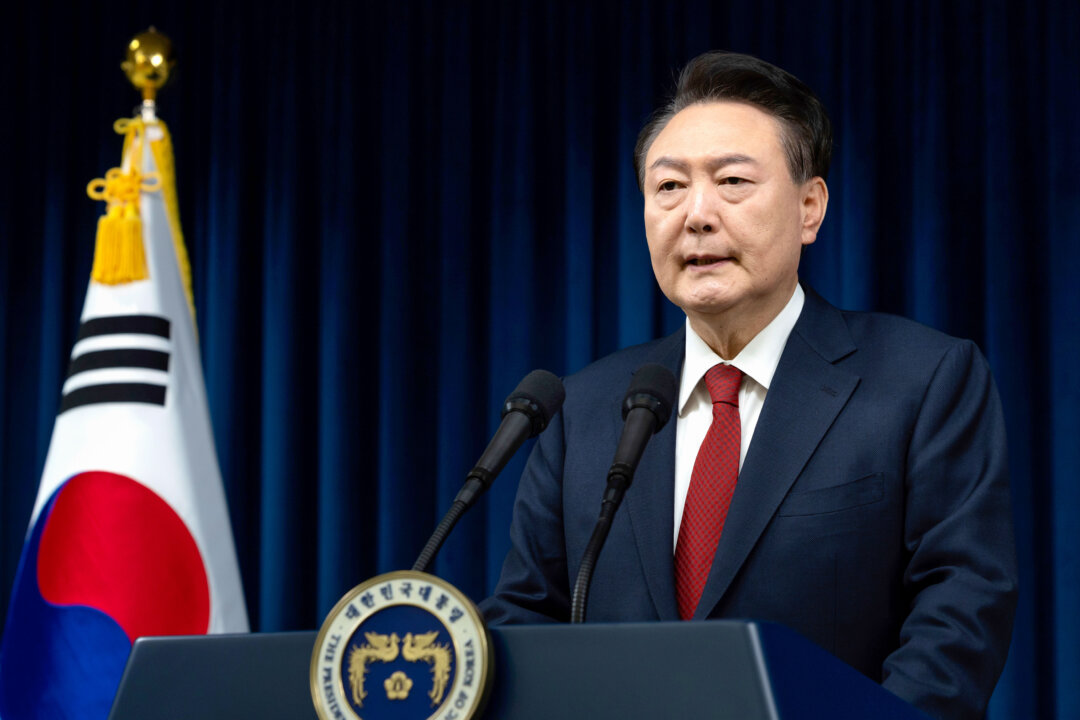Yoon Suk Yeol briefly declared martial law on Dec. 3 in a move that saw troops take to the streets of Seoul before the action fizzled out later the same day.
South Korean President Yoon Suk Yeol was banned from leaving the country by the nation’s Justice Ministry on Dec. 9, after he briefly declared martial law last week.
Yoon’s decree on Dec. 3, which brought soldiers onto the streets of Seoul, plunged the country into political turmoil and sparked international concern.
Authorities are now investigating the president over several charges, including rebellion.
On Dec. 7, Yoon narrowly avoided impeachment, after most governing party lawmakers boycotted a parliamentary vote.
But the opposition parties have vowed to submit another impeachment motion this week.
Bae Sang-up, an official in the Justice Ministry, told a parliamentary hearing that the ministry had banned Yoon from leaving South Korea after requests were made by police, prosecutors, and an anti-corruption agency.
Though a sitting president has immunity from prosecution while in office, that privilege does not extend to alleged rebellion or treason.
This means that Yoon can be questioned and detained by police regarding his martial law decree; however, many doubt he will be forcibly detained because of the potential of clashes between police and the presidential security service.
When former President Park Geun-hye was thrown out of office in 2017 after being impeached because of a corruption scandal, prosecutors ended up receiving documents outside the compound because presidential officials turned investigators away.
Park refused to meet with prosecutors while in office but was eventually questioned and arrested after the Constitutional Court approved her impeachment and dismissed her from office that same year.
The opposition Democratic Party described Yoon’s fleeting martial law imposition as “unconstitutional, illegal rebellion or a coup.”
The party has filed police complaints against at least nine people, including Yoon and his former defense minister, in relation to the alleged coup.
Prosecutors on Dec. 8 detained former Defense Minister Kim Yong Hyun, who is said to have urged Yoon to declare martial law, becoming the first person detained connected to the case.
The Defense Ministry last week separately suspended three top military commanders for their alleged involvement in imposing martial law.
Yoon issued an apology on Dec. 7 regarding the incident, adding that he wouldn’t run from legal or political responsibility for the declaration.
He said he would leave it to his People Power Party (PPP) to chart a course through the country’s political turmoil, including matters related to his term in office.
Since taking office in 2022 for a single five-year term, Yoon, a conservative, has been on a near-constant collision course with his liberal rivals who control Parliament.
The liberals have brought a string of motions to impeach his top officials and embarked on an aggressive political campaign against Yoon centered on a spate of scandals involving him and his wife.
Yoon called Parliament a “den of criminals” bogging down state affairs when he declared martial law on Dec. 7, and he said he would eliminate “shameless North Korea followers and anti-state forces.”
The martial law decree lasted only six hours because the National Assembly voted it down, forcing Yoon’s Cabinet to lift it before dawn on Dec. 4.
Some members of Yoon’s party cast ballots against the decree, but the party later moved to oppose impeachment.
Experts say Yoon’s party fears losing the presidency to liberals in a by-election if he is ousted, similar to what happened after Park was ejected from office.
PPP leader Han Dong-hun said over the weekend that the party will push for Yoon’s early and orderly exit from office but didn’t give a timeframe. He said Yoon will not be involved in state affairs, including foreign policy.
During a briefing on Dec. 9, the Defense Ministry said Yoon retains control of the military, a power explicitly reserved for the president in South Korea’s constitution.
The Associated Press contributed to this report.

